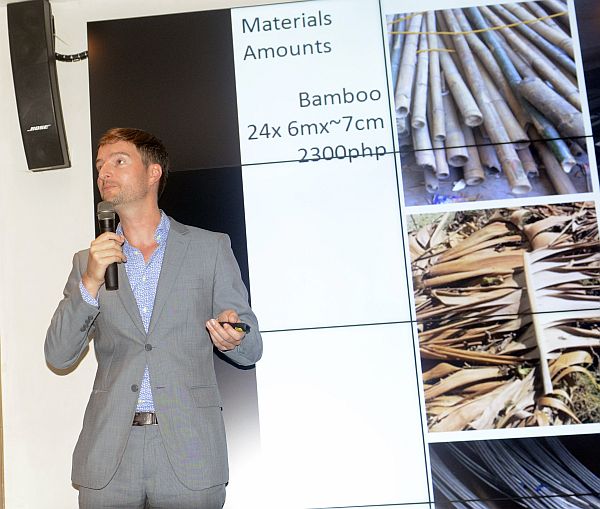‘Multi-sector front to solve Cebu’s woes’

Senior lecturer Rick Heikoop of the Rotterdam University talks about waste management during Friday’s Rafi forum.
(CDN Photo/Christian Maningo)
Solving Metro Cebu’s waste and water management issues amid rapid urbanization and climate change starts with government collaboration with stakeholders, two visiting Dutch experts said last Friday.
Rick Heikoop, senior lecturer on water management at the Rotterdam University of Applied Science and coordinator of Living Labs, said community involvement is crucial in resolving Cebu’s “wicked problems.”
“We can apply the triple helix approach, where the government takes charge of political matters, the academe contributes knowledge, and business can possibly finance. In other cases, the quadruple helix can be used, with the addition of nongovernment organizations,” he said during last Friday’s Understanding Choices Forum hosted by the Ramon Aboitiz Foundation Inc. (Rafi).
The forum discussed at length Cebu’s problems in waste and water management in relation to urbanization and climate change and presented strategies and models from other countries to resolve said problems.
Rafi, the Netherlands-based Rotterdam University, and the University of San Carlos (USC) in Cebu signed an agreement to collaborate on waste and water management in the next three years.
The partnership involves a River Summit to be held in Mandaue City in November 2018, grants for Cebuano students to study in the Netherlands, City Scan Challenges, and grants for small projects.
Dutch experts and foreign students were in Cebu this week to help determine the state of the metropolitan’s waste and water management and find common solutions to these problems.
Heikoop said Cebu’s problems include garbage, pollution of rivers and sedimentation in the Buhisan Dam.
“It will not be easy solving these because it will require a huge budget and expertise,” he said.
Heikoop said what Cebu lacks are private sector involvement, specific expertise, leadership and ownership, sufficient political or societal support to tackle the problem, finances, collaboration with international partners, and international best practices.
He said the partnership among Rafi, Rotterdam University, and USC gives him hope that they will see gains in the next three years.
Dr. Floris Boogard, senior consultant on water management at Tauw BV in the Netherlands and professor at Hanze University of Applied Science, cited the canals in Amsterdam that were cleaned of garbage several years ago.
“What we did to achieve this was we analyzed the problem, we came up with an ambition, and we worked toward it with an action plan. Of course, we also learned from our mistakes,” he said.
Bart van Bueren, a visiting expert on sustainable and climate adaptation architecture at the Taiwan-based National Cheng Kung University, meanwhile, proposed floating gardens.
He said the gardens can be made out of bamboo, abaca, other biological materials and planted with mangroves to improve water purification.
It can help prevent coastal erosion and costs P2,500 each.
Tijmen den Oudendammer, a lecturer on water management at Rotterdam University of Applied Sciences, on the other hand, called for a transition in waste management.
This involves the reduction, reusing, recycling, and conversion into energy of plastic materials, which are considered to be one of the world’s biggest pollutants.
“Reduction of waste is the key. It is also not cheap to dump waste in landfills. Recycling will give you money,” he said.
Sean Ligtvoet, a waste water treatment and sanitation specialist at the Department of Science and Technology (DOST) in Davao City, also proposed putting up Vertical Helophyte Filter Systems (VHFS).
He said helophytes are reed-like plants that help clean waste water as it passes through the ground. Ligtvoet was the first person to install a VHFS in Davao City.
DOST’s filtration system costs P250,000 while commercial systems may cost P5 million, he said.
Disclaimer: The comments uploaded on this site do not necessarily represent or reflect the views of management and owner of Cebudailynews. We reserve the right to exclude comments that we deem to be inconsistent with our editorial standards.
